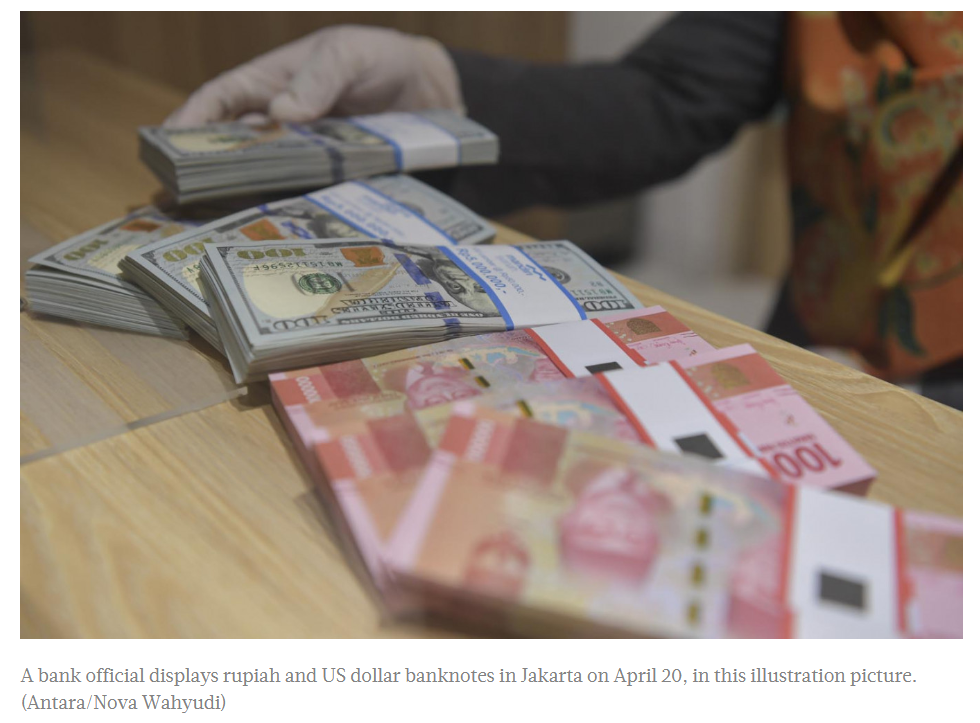Indonesia: BI, government to share debt burden to finance business rescue program
The government and Bank Indonesia (BI) will “share the burden” on debt to finance rescue packages for businesses severely hit by the COVID-19 pandemic, a top official has said.
The Finance Ministry’s fiscal policy agency (BKF) head Febrio Kacaribu said that the government was looking for the cheapest financing option to support economic recovery. Therefore, the government is currently working on financing details with the central bank.
“The principle of this economic recovery program is sharing the burden and risks,” Febrio told reporters during a press briefing on Wednesday. “BI should be concerned with financing needs. If the government had to bear all the debt interest, this would be hard for us.”
The government has allocated Rp 318 trillion (US$21.28 billion) for the so-called economic recovery program, according to a Finance Ministry document presented in a meeting with lawmakers recently, a copy of which was obtained by The Jakarta Post. The rescue program will include capital injections into state-owned enterprises (SOEs) and loan subsidies for micro, small and medium businesses.
To finance the budget needs, the government will issue debt papers that can be bought directly by BI with coupon rates and other technical mechanisms to be decided later. The BI governor and finance minister will be in charge of the “special account” for the program funds, according to Government Regulation (PP) 23/2020 on the economic recovery program.
BI expects to cover an estimated Rp 150 trillion to finance the program via private placement of government bonds, the central bank’s head of monetary management Nanang Hendarsah said. The bonds will have lower yields than the market rate but higher than the central bank pays for its monetary operations, Nanang added.
He gave an example of BI buying 10-year bonds with a yield of 4.9 percent, or similar to BIs 12-month term-repo rate, which is below the 8.08 percent offered in auctions.
“So BI is sharing the burden by about 3.2 percentage points,” Nanang said as quoted by Reuters, stressing that this meant BI would be able to absorb excess liquidity in the future in case of inflationary pressures.
BI made its first direct purchase of government bonds in an auction in late April, after the government relaxed rules to help finance the government’s widening budget deficit. The central bank was previously prohibited from buying government bonds in the primary market and could only buy the debt papers in the secondary market.
There have been concerns that the policy could induce inflationary pressures in the economy as the central bank provides funding to the government to rescue businesses and contain COVID-19. However, the decision was made in consideration of the global market rout that has resulted in foreign investors fleeing Indonesia.
Foreign investors sold Indonesian assets worth Rp 145 trillion in the first quarter, higher than the capital outflows recorded during the 2008 global financial crisis in 2008 and the 2013 “taper tantrum” combined.
“I think this needs to be conducted extremely prudently and carefully. This is an extraordinary situation in which we need funds to contain COVID-19 while there are pressures on bonds, especially given global market conditions,” Bank Central Asia (BCA) economist David Sumual said.
“The dilemma of BI in the primary market is how the coupon rate will be [priced]. The funds will be coming from the same pocket, and therefore the market rate will not be applicable.”
The policy of conducting private placement between the government and BI will allow breathing room for the state budget in financing business rescue programs, added David.
The funds are expected to provide a cushion to businesses battered by the COVID-19 pandemic, many of which have resorted to layoffs and furloughs to sustain operations, with some completely closing down already.
Nearly half of the budget for the business-rescue program, at more than Rp 152 trillion, has been allocated for SOEs, according to a Finance Ministry document. Flag carrier Garuda Indonesia will receive a government investment for working capital worth Rp 8.5 trillion, steelmaker PT Krakatau Steel will get Rp 3 trillion and the State Logistics Agency (Bulog) Rp 13 trillion.
Febrio declined to provide details or to confirm how much funds the government would provide SOEs, saying the policy would need first to be approved by President Joko “Jokowi” Widodo in a Cabinet meeting.
He added that businesses would find it hard to sustain operations as regions around the archipelago implemented large-scale social restrictions to slow the spread of the virus.
“Data suggest we’re heading for an even worse period than the first quarter, very likely to be negative growth,” said Febrio. Indonesia’s economy may contract in the second quarter this year after growing 2.97 percent in the first quarter, the lowest level in 19 years. The government’s worst-case scenario projects a 0.4 percent GDP contraction this year.
Source: https://www.thejakartapost.com/news/2020/05/13/bi-government-to-share-debt-burden-to-finance-business-rescue-program.html


 Thailand
Thailand




